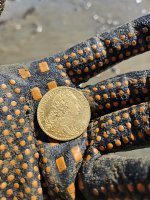friend of mine is from morocco and he told me that his great great grandfather used to bury his income at a certain point in the forest on his way home from work he used to have a transporting company and because he feared being robbed he used to stop at a certain point and hide the coins where he hid them is a mistery but the area isnt so big but there is allot of junk so he has been wondering if detectors can be set to find gold only but ignore the bottle caps and other junk he thinks he couldn't have buried them very deep.
so any advice on how it would be best to find them coins would be greatly appreciated
thanks
so any advice on how it would be best to find them coins would be greatly appreciated
thanks
Upvote
0





